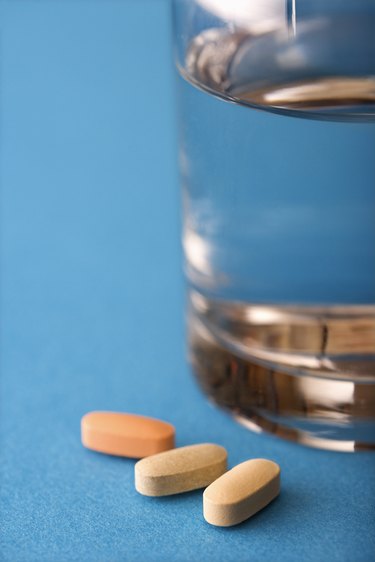
HPV, or human papillomavirus, is a viral grouping of nearly 200 types that cause warts on the hands, feet and genitals of men and women. HPV of the genitals can be transmitted through sexual contact and is associated with cervical cancer. There is no recognized cure for HPV, but some vitamins display antiviral properties or stimulate the immune system and mitigate symptoms, and possibly reduce virulence.
Human Papillomavirus
Video of the Day
Persistent HPV infections are a significant cause of cervical cancers, which leads to the deaths of more than 4,000 American women each year, according to the National Cancer Institute. Most HPV genital infections in young women are temporary, as 70 percent are gone in a year and have little long-term affect. However, when HPV infection persists, as it does in up to 10 percent of women, there is a higher risk of developing precancerous lesions of the cervix, which can progress to invasive cervical cancer. This process usually takes between 15 and 20 years to develop.
Video of the Day
Vitamin B12 and HPV
In general, all B vitamins are involved with cellular metabolism and energy production to varying degrees, which is necessary to provide the vast amount of energy needed for the immune system to fight off infections such as HPV. Vitamin B12 is thought to destroy HPV and possibly prevent cervical cancer through DNA methylation, which disrupts viral replication. A 2002 study was published in the American Medical Association's "Cancer Epidemiology Biomarkers and Prevention" and found that circulating vitamin B12 levels were inversely associated with HPV persistence. In other words, women who had the highest blood levels of B12 were least likely to develop a persistent HPV infection. The researchers concluded that higher levels of B12 in the blood may play a role in preventing early cervical carcinogenesis.
Vitamin D and HPV
Vitamin D, which is synthesized within the skin in response to sunlight, is also a supportive nutrient for strong immunity. A study published in a 2010 edition of "Nature Immunology" found that vitamin D is essential for activating killer T cells of the immune system so they can detect and eliminate invading pathogens, potentially preventing serious infections. Killer T cells, which are produced in the thymus gland, have the potential to eliminate viruses such as HPV. Further, there are anecdotal reports that vitamin D applied directly to warts suppresses their growth.
Other Nutrients and HPV
Vitamins B12 and D are not the only natural nutrients that can help with symptoms and proliferation of HPV. According to "Vitamins: Fundamental Aspects in Nutrition and Health," vitamins C, B6 and folic acid also stimulate the immune system or disrupt viral replication and may be helpful with HPV infections. Herbal remedies that are considered effective against viruses include Echinacea, amaranth, chaparral and olive leaf extracts, astragalus, garlic cloves and tea tree oil, as cited in "Medical Herbalism: The Science Principles and Practices of Herbal Medicine."
- National Cancer Institute: Cervical Cancer Page
- "Cancer Epidemiology Biomarkers and Prevention"; Human Papillomavirus Persistence and Nutrients Involved in the Methylation Pathway Among a Cohort of Young Women; R.L. Sedjo et al; April 2002
- “Nature Immunology”; Control of T Cell Activation by Vitamin D; J. Smolders et al; December 2010